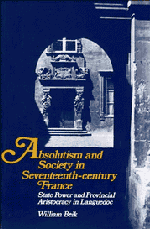 Absolutism and Society in Seventeenth-Century France
Absolutism and Society in Seventeenth-Century France Book contents
- Frontmatter
- Contents
- List of tables
- List of figures
- Preface
- List of abbreviations
- Map: Languedoc in the seventeenth century
- PART ONE INTRODUCTION
- PART TWO THE DISTRIBUTION OF AUTHORITY
- 3 Urban setting and local authorities
- 4 The sovereign courts: a provincial perspective
- 5 The royal agents: a national linkage
- 6 The Estates: central bargaining place
- PART THREE THE PROVINCE ON ITS OWN
- PART FOUR THE PROVINCE AND THE CROWN
- Conclusion
- Appendix: Breakdown of taxes from the diocese of Toulouse, 1677
- Select bibliography
- Index
6 - The Estates: central bargaining place
Published online by Cambridge University Press: 05 July 2011
- Frontmatter
- Contents
- List of tables
- List of figures
- Preface
- List of abbreviations
- Map: Languedoc in the seventeenth century
- PART ONE INTRODUCTION
- PART TWO THE DISTRIBUTION OF AUTHORITY
- 3 Urban setting and local authorities
- 4 The sovereign courts: a provincial perspective
- 5 The royal agents: a national linkage
- 6 The Estates: central bargaining place
- PART THREE THE PROVINCE ON ITS OWN
- PART FOUR THE PROVINCE AND THE CROWN
- Conclusion
- Appendix: Breakdown of taxes from the diocese of Toulouse, 1677
- Select bibliography
- Index
Summary
The sessions of the Estates were a major event in the yearly life of Languedoc. For those involved they were a high point in the social season in which the leading members of the three orders could act out to full advantage their subtle differences in rank, status, and personal prerogatives; and even for those too low in the scale to participate, the processions and ceremonies provided large-scale diversion. This pageantry, so seemingly superficial, was deadly serious, for the Estates were the place where political bargains were realized, relative influence was tested, and contacts were made or reinforced with individuals close to the king. Moreover, unlike the other agencies we have examined, the Estates transacted business of a genuinely political nature – business in which the conflicting interests of various groups had to be negotiated. They provided a central bargaining place, but not for all dominant groups equally – much less the entire population since they viewed issues from a particular social perspective.
The meetings were held once a year, usually in the autumn or winter, for a period of about three to six weeks, or sometimes longer if unresolved difficulties kept the royal agents from realizing their manipulative schedule. The king convoked the Estates regularly every year because the alternative was to do without taxes or to find another collection method. He also designated the site, which was usually one of the centrally-located bishoprics of Bas-Languedoc: Montpellier, Nimes, Béziers, or Narbonne.
- Type
- Chapter
- Information
- Absolutism and Society in Seventeenth-Century FranceState Power and Provincial Aristocracy in Languedoc, pp. 117 - 146Publisher: Cambridge University PressPrint publication year: 1985
- 1
- Cited by
